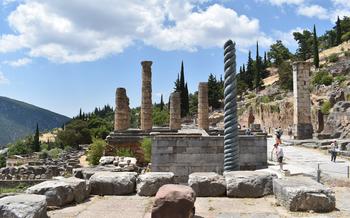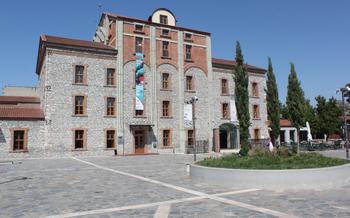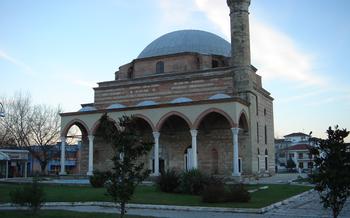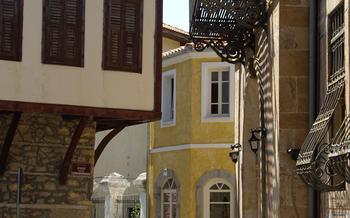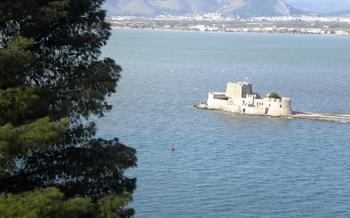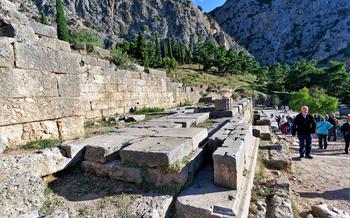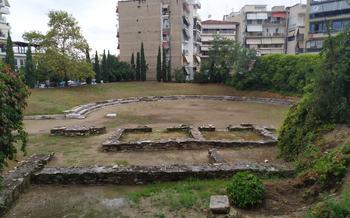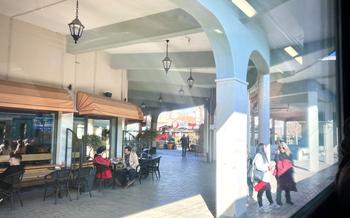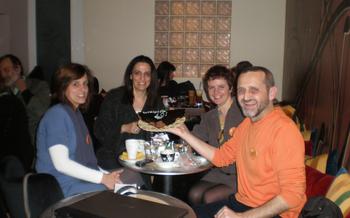
Folklore Museum of the University of Thessaly
- A Stroll in the Green Heart of Larissa:
- A Journey Through Time: The History of the Folklore Museum
- Treasures of Greek Folklore: The Museum's Collection
- Folklore in Action: Interactive Exhibits
- Beyond Artifacts: The Museum's Cultural Events
- A Glimpse into Greek Traditions: The Museum's Publications
- A Symbol of Cultural Pride: The Museum's Impact
- Practical Information for Visitors: Planning Your Visit
- Getting There: Transportation Options
- Public Transportation
- Taxi Services
- Parking
- Insider Tip: Finding the Most Convenient Option
- Exploring the Neighborhood: What's Nearby?
- Insider Tip: Discovering a Culinary Gem
- Local Customs and Etiquette: Respecting Greek Culture
- Photography and Social Media: Capturing Your Experience
- Accessibility for All: Ensuring an Inclusive Experience
- Insider Tip: A Hidden Gem for Folklore Enthusiasts
A Stroll in the Green Heart of Larissa:
Nestled amidst the vibrant cityscape of Larissa, the Folklore Museum of the University of Thessaly invites visitors to immerse themselves in a verdant oasis of tranquility. As you approach the museum, you will be greeted by a sprawling park, a sanctuary of serenity that offers a welcome respite from the bustling urban landscape. The meticulously landscaped grounds are a testament to the harmonious blend of nature and culture, showcasing a diverse array of flora and fauna that thrive within this urban haven. Take a leisurely stroll along the winding paths, admiring the vibrant blooms, towering trees, and the gentle murmur of the water features that add a touch of tranquility to the atmosphere. Whether seeking a moment of solitude or a peaceful retreat with friends, the park surrounding the Folklore Museum is an ideal destination to reconnect with nature and appreciate the beauty of the natural world.
A Journey Through Time: The History of the Folklore Museum
The Folklore Museum of the University of Thessaly stands as a testament to the rich cultural heritage of Greece. Its establishment was driven by a profound vision: to preserve and showcase the traditional customs, beliefs, and practices that have shaped Greek identity for centuries. The museum's mission is to serve as a center for the study and appreciation of Greek folklore, fostering a deeper understanding of the nation's cultural roots.
The museum's history is intertwined with the University of Thessaly's commitment to promoting cultural heritage. Recognizing the importance of preserving traditional knowledge and practices, the university established the Folklore Museum in 198Since its inception, the museum has grown into a renowned institution, attracting visitors from around the world who seek to delve into the vibrant tapestry of Greek folklore.
The museum's vast collection of artifacts and exhibits offers a comprehensive overview of Greek traditional culture, encompassing everything from everyday objects to elaborate ceremonial costumes. Through its educational programs, workshops, and cultural events, the Folklore Museum serves as a dynamic platform for promoting and revitalizing Greek folklore, ensuring that these precious traditions continue to thrive in the modern world.
Treasures of Greek Folklore: The Museum's Collection
Step into the Folklore Museum of the University of Thessaly, and you'll be greeted by a treasure trove of artifacts that showcase the rich tapestry of Greek folklore. Embark on a journey through time as you explore traditional costumes that tell stories of regional identity and craftsmanship. Marvel at the intricate embroidery and woven textiles, each stitch carrying cultural significance and artistic prowess. Discover ceramic ware that reflects the essence of everyday life, metalwork that gleams with the skill of master artisans, and wood carvings that whisper tales of a bygone era. Every artifact in this collection is a testament to the enduring spirit and creativity of the Greek people.
Delve deeper into the symbolism and meaning behind each artifact, and you'll uncover a world of beliefs, customs, and traditions that have shaped Greek culture for centuries. Learn how clothing, pottery, and decorative objects were not merely functional items but also symbols of identity, status, and cultural heritage. Explore the stories and legends associated with these objects, and you'll gain a profound understanding of the soul of Greece.
The Folklore Museum's collection is not just a display of ancient artifacts; it's a living testament to the continuity of Greek tradition. Many of the techniques and designs showcased here are still practiced by contemporary artisans, ensuring that the spirit of Greek folklore remains vibrant and alive. As you wander through the museum's galleries, you'll not only gain knowledge but also a deep appreciation for the enduring legacy of Greek culture.
Folklore in Action: Interactive Exhibits
The Folklore Museum of the University of Thessaly brings folklore to life with vibrant displays and interactive exhibits. Multimedia presentations showcase traditional music, dance, and storytelling, immersing visitors in the rich cultural heritage of Greece. Hands-on activities allow visitors to experience firsthand the beauty and intricacy of traditional crafts, such as weaving, embroidery, and pottery. Educational programs and workshops provide opportunities for deeper exploration and learning, fostering a greater appreciation for Greek folklore. Through these interactive experiences, the museum creates a dynamic and engaging environment that captivates visitors of all ages, making it a truly unforgettable cultural destination.
Beyond Artifacts: The Museum's Cultural Events
The Folklore Museum of the University of Thessaly transcends its role as a mere repository of artifacts, transforming into a vibrant hub of cultural events that bring folklore to life. Delve into the museum's calendar and discover a rich tapestry of traditional dance performances, music concerts, and storytelling sessions. These events offer a unique opportunity to witness the living essence of Greek folklore, as talented performers showcase their skills and share their passion with the audience.
Participate in workshops and seminars organized by the museum to delve deeper into the intricacies of Greek folklore. These educational programs provide hands-on experiences, allowing visitors to engage with traditional crafts, learn about customs, and gain insights into the symbolism and significance of folklore in Greek culture. Immerse yourself in the vibrant cultural community that surrounds the museum, where enthusiasts, scholars, and artists converge to celebrate and preserve the rich heritage of Greece.
A Glimpse into Greek Traditions: The Museum's Publications
The Folklore Museum of the University of Thessaly boasts an extensive collection of publications that offer a profound dive into the realm of Greek folklore. These publications encompass scholarly journals, meticulously researched papers, and comprehensive books that delve into the diverse aspects of Greek cultural heritage. Through these publications, the museum serves as a treasure trove of knowledge, providing access to the latest findings and insights from experts in the field.
Whether you're an academic researcher seeking to expand your understanding of Greek folklore or an enthusiast seeking to enrich your personal knowledge, the museum's publications offer a wealth of information. Explore the intricacies of traditional customs, unravel the symbolism behind intricate embroidery, and gain insights into the significance of ancient rituals.
The museum's publications not only document the rich tapestry of Greek folklore but also serve as a testament to the institution's unwavering commitment to preserving and promoting this invaluable heritage. Delve into these publications to gain a deeper appreciation for the enduring traditions that continue to shape contemporary Greek society.
A Symbol of Cultural Pride: The Museum's Impact
The Folklore Museum of the University of Thessaly serves as a beacon of cultural pride, playing a pivotal role in preserving and promoting the rich traditions of Greece. Through its extensive collection, interactive exhibits, and cultural events, the museum has become a hub for the revitalization of traditional crafts and customs. It has fostered a deep sense of cultural identity and pride among the local community and visitors alike.
The museum's dedication to showcasing the diverse expressions of Greek folklore has contributed to a renewed appreciation for the country's cultural heritage. It has inspired a new generation of artisans, storytellers, and performers to embrace and perpetuate these traditions. Furthermore, the museum's educational programs and workshops have provided a platform for the transmission of traditional knowledge and skills to future generations.
By celebrating the beauty and diversity of Greek folklore, the museum has fostered a sense of unity and belonging among the people of Larissa and beyond. It serves as a reminder of the vibrant cultural tapestry that makes Greece a unique and captivating destination. The museum's impact extends far beyond its walls, contributing to the preservation and promotion of Greek cultural heritage on a national and international level.
Practical Information for Visitors: Planning Your Visit
Before embarking on your journey to the Folklore Museum of the University of Thessaly, it's essential to plan your visit to ensure a smooth and enriching experience. The museum welcomes visitors from Tuesday to Sunday, with varying opening hours. To fully immerse yourself in the museum's treasures, consider allocating at least two hours for your visit. Admission fees are nominal, offering excellent value for the wealth of knowledge and cultural insights you'll gain. Guided tours are available upon request, providing an in-depth exploration of the museum's collection and history. To make the most of your visit, it's advisable to avoid peak tourist seasons, particularly during the summer months, when crowds can be overwhelming. The museum offers a serene ambiance during the shoulder seasons (spring and autumn), allowing for a more intimate and contemplative experience. For visitors with disabilities, the museum is fully accessible, with wheelchair ramps, elevators, and accessible restrooms. The museum staff is always ready to assist and provide any necessary accommodations, ensuring an inclusive and enjoyable visit for all.
Getting There: Transportation Options
Public Transportation
The Folklore Museum is conveniently accessible via public transportation. Several bus routes stop nearby, making it easy to reach from various parts of the city. From the central bus station, take routes 1, 3, or 8 to "Folklore Museum" or "University of Thessaly" stops. Buses run frequently throughout the day, ensuring a hassle-free commute.
Taxi Services
Taxis are readily available in Larissa and can be hailed on the street or ordered through a ride-hailing app. The trip from the city center to the museum typically takes around 10-15 minutes, depending on traffic conditions. Taxis offer a convenient and comfortable option for those who prefer a direct and personalized journey.
Parking
For those traveling by car, the museum offers ample parking space. Visitors can park their vehicles in the designated parking lot, located adjacent to the museum building. The parking lot is free of charge and provides a safe and secure space for visitors' vehicles.
Insider Tip: Finding the Most Convenient Option
To ensure a smooth and convenient journey, it's advisable to plan your transportation in advance. Check bus schedules and routes to avoid any delays. If you're traveling during peak hours, consider taking a taxi to avoid potential traffic congestion. For a more budget-friendly option, opt for public transportation, which offers affordable fares.
Exploring the Neighborhood: What's Nearby?
Venturing beyond the Folklore Museum's walls, visitors will discover a vibrant neighborhood teeming with hidden gems. A short stroll leads to a plethora of traditional Greek tavernas, where the tantalizing aromas of grilled meats and freshly baked pastries fill the air. Indulge in culinary delights such as succulent souvlaki, savory moussaka, and the ever-popular baklava while immersing yourself in the lively ambiance of local life.
Just around the corner, history buffs can delve into the past at the Larissa Archaeological Museum, which houses a remarkable collection of artifacts from the region's rich history. From ancient pottery and sculptures to intricate mosaics, the museum offers a glimpse into the lives and culture of civilizations that once flourished here.
For a tranquil respite, visitors can wander through the nearby Alkazar Park, a verdant oasis in the heart of the city. With its lush greenery, serene ponds, and playground for children, the park offers a welcome escape from the hustle and bustle of urban life.
Insider Tip: Discovering a Culinary Gem
Nestled amidst the narrow cobblestone streets, just a stone's throw from the Folklore Museum, lies a culinary gem known only to discerning locals. Taverna To Steki tou Ilia serves authentic Greek cuisine prepared with fresh, seasonal ingredients and infused with the warmth of family recipes. From melt-in-your-mouth kleftiko to aromatic pastitsio, each dish is a testament to the passion and skill of the taverna's chef. Don't miss the chance to savor the flavors of traditional Greece in this hidden gem.
Local Customs and Etiquette: Respecting Greek Culture
When visiting the Folklore Museum of the University of Thessaly, it is important to be mindful of local customs and etiquette to ensure a respectful and enjoyable experience. Dress modestly and appropriately, avoiding revealing or overly casual attire. Be respectful of the museum's artifacts and exhibits, and avoid touching or interacting with them unless explicitly permitted. When engaging with the museum staff and other visitors, be polite and respectful, using appropriate greetings and avoiding loud or disruptive behavior. Remember that the museum is a place of cultural preservation and learning, so embrace the opportunity to immerse yourself in Greek culture and traditions.
Photography and Social Media: Capturing Your Experience
As you wander through the Folklore Museum, you'll be tempted to capture the beauty and essence of the exhibits through photography. While photography is generally allowed within the museum, there are some guidelines to ensure a respectful and enjoyable experience for all visitors:
-
Flash Photography: To preserve the delicate artifacts and ensure the best viewing experience for everyone, flash photography is not permitted within the museum.
-
Tripods and Selfie Sticks: For safety reasons, the use of tripods and selfie sticks is not allowed in the exhibition areas.
-
Respecting Others: When taking photos, be mindful of other visitors and avoid blocking their view or disturbing their enjoyment of the exhibits.
-
Social Media Sharing: Share your experiences with the world by using relevant hashtags and tagging the museum on social media platforms. Encourage your friends and followers to explore this treasure trove of Greek folklore.
Accessibility for All: Ensuring an Inclusive Experience
The Folklore Museum of the University of Thessaly is committed to providing an inclusive and accessible experience for all visitors. The museum features a range of accessibility features to ensure that visitors with disabilities can fully enjoy and engage with its exhibits. These features include ramps and elevators for wheelchair users, audio guides for the visually impaired, and clear signage throughout the museum. The museum staff is also trained to assist visitors with disabilities and can provide any necessary assistance. For visitors with specific accessibility needs, it is recommended to contact the museum in advance to ensure that all necessary arrangements can be made.
Insider Tip: A Hidden Gem for Folklore Enthusiasts
My first encounter with the Folklore Museum of the University of Thessaly was nothing short of magical. As I stepped through its doors, I was transported to a realm where tradition and history intertwined. The intricate embroidery on the traditional costumes, the delicate patterns on the woven textiles, and the intricate carvings on the wooden artifacts whispered tales of a bygone era.
One exhibit that particularly captivated my attention was a collection of traditional musical instruments. From the haunting melodies of the bouzouki to the rhythmic beats of the دف, each instrument seemed to hold the secrets of an ancient civilization. As I listened to the enchanting sounds, I felt a deep connection to the rich musical heritage of Greece.
The museum is more than just a repository of artifacts; it is a living, breathing testament to the enduring spirit of Greek folklore. Through its interactive exhibits and cultural events, the museum provides a platform for the preservation and promotion of traditional customs and beliefs.
Whether you are a seasoned traveler, a history buff, or simply someone with a deep appreciation for culture, the Folklore Museum of the University of Thessaly is a hidden gem that should not be missed. Prepare to be captivated as you immerse yourself in the vibrant tapestry of Greek folklore.
